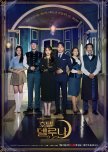
The Hong Sisters Have Finally Returned To Wonderland..
For most watchers first looking over the drama, Yeo Jin Goo ( Hwayi; A Monster Boy and Moon Embracing The Sun) would seem to be one to steal the show from his legendary roles in numerous dramas and movies , yet, instead, it is IU ( My Mister and The Producers) ‘s role as the angel-faced yet foul-mouthed owner of the hotel, Jang Man- Wol who instead quickly steals the show from Jin Goo in her glamorous frocks.
From inspired attires straight out of Daphne Du Maurier’s gothic modern romance tale , Rebecca ( 1938), to Katherine Hepburn’s little black dress in a favourite film of the Hong Sisters, Breakfast At Tiffany’s ( 1961), IU
truly embodies the mature and complex core of a cynical female lead who is shaped by her own experiences and choices rather than merely love itself.
Yet whilst the casting of the show is fairly diverse with fellow Kpop costar P.O being cast as the giddy hotel receptionist and Bae Hae- Sun as the strict housekeeper of the hotel, some of the roles within the show (especially the storywriting ) felt slightly lacklustre in comparison. ( Particularly P.O and Kang Mi- Na’s romance as their respected characters, which did have some bittersweet moments in particular to P.O’s character, but Mi Na’s character Soo- Jung had little relatability despite her tragic circumstances).
Admittedly this isn’t entirely the fault of the actors as one noticeable flaw which arose in the drama was how the Hong Sisters had added little complexity or emotional value in regards to the respected storylines of some of the other characters (excluding Man Wol of course). The biggest example of this arose with Jin Goo’s character, Gu Chan-Sung.
Man Wol was supposed to be the fiery ‘Yang’ to Chan Sung’s level- headed ‘ Ying’ personality within their relationship, there was little to actually express or delve into Gu Chan- Sung apart from the evident plot roles. His father dies several years presumably after his first scene in a flashback in the show , yet Chan- Sung neither really expresses anguish nor heartbreak at this fact. Whilst there is the arguable emphasis that Chan-Sung is too rational to break down over these matters, this is greatly contradicted within the scene when Chan- Sung simply loses his composure at a bus stop over thoughts of Man- Wol. Undeniably a heartbreaking scene and a moment of brilliant acting from Goo, this scene just doesn’t entirely add with the intended composure of Chan Sung who in several episodes prior, who didn’t bat an eyelid to the return of his mother as a ghost.
This also moves us onto the other problem of Hotel Del Luna; how the storyline played out. Ironically, Hotel Del Luna’s biggest problem wasn’t trying to adhere to the typical cliches, but instead trying to overcome them at the last minute. Obviously, there is nothing wrong with a drama doing this, however, where the evident flaw lies for Hotel Del Luna is that rather than only doing this a couple of times to mark a red herring by diverting the audience’s attention ( and then deliver an actual plot-twist by moving onto the expected becoming the unexpected), the Hong Sisters tried to do this at every given opportunity during the storyline. Without spoiling anything, I will say this. The novelty of the storytelling becomes less effective when you did this too often, and so whilst Hotel Del Luna was certainly interesting within certain character plot-lines ( particularly Jang Wol’s past), some of the show for a major part felt anticlimactic and disjointed in the long run.
On a more positive note, however, Hotel Del Luna’s magic is greatly brought to life through fairly good CGI and storytelling upon this element. Whilst not entirely touching new ground in the face of predecessor shows like Goblin , Hotel Del Luna still brings its own element of dark fantasy through traditional Korean mythology being brought into modern Seoul. From disturbing evil spirits, bartender ghosts like Kim Seon Bi ( Shin Jung- Geum) to deities such as the mysterious Mago ( Seo Yi- seok) with unpredictable plans of fate for our main characters.
Additionally, whilst the finale of Hotel Del Luna has caused a lot of debate amongst drama fans, the bittersweet ending was surprisingly appropriate for the drama . Overall Hotel Del Luna was an enjoyable watch (although perhaps flawed by some elements of the storyline and certain characters’ contributions to the show )-the elements of dark fantasy, traditional mythology and IU’s stellar performance as the twisted and cynical Man- Wol will keep you captivated. Although not flawless, definitely worth a watch.
Was this review helpful to you?

Was It Love , Or A Waste of Time?
As Korean romance dramas go, “ Was it Love?” certainly wasn’t one of the worst Korean dramas out there, with some intriguing themes tackled such as motherhood, parentage and abortion as well.What is fair to say, however, is that “ Was it Love?” had so many opportunities throughout the drama to play upon its own cliches of the mysterious father, particularly through Noh Ae-jung ( Song Ji hyo)’s daughter, Ha-nee ( Uhm Chae-young )’s being allowed to bond with her potential fathers in equal manners such as ;
famous actor Ryu Jin ( Song Jong ho), financial head Koo Pa-do ( Kim Moon Joon) , P.E. teacher Oh Yeon-woo ( Koo Ja- Sung) and novelist Oh Dae- Oh ( Son Ho Jun) respectfully throughout the entirety of the show.
Although Song Ji hyo did captivate some of the elements of her character’s determination upon screen at times ( in addition to the scriptwriting ), her acting at times seemed a little wooden and thus didn’t help in making Ae-Jung’s personality seem often very lacklustre.
Of course that’s not to say that Ae- Jung was quintessentially a terrible character as there is no denying that Ae-Jung did seem to share genuine love and affection for both her daughter and her mother Choi Hyang-ja ( Kim Mi Kyung) throughout the drama . On the other hand, “ Was it Love?” ‘s biggest flaw soon became apparent by the scriptwriters’ decision to cram-in as much plot focus upon the aspects of Ae- Jung’s seemingly lingering “chemical” relationships with each of the respected male leads of the drama. Although it was undeniable that most of the actors were fairly brilliant in their respected roles, there were too many cliches which brought lacking emphasis upon characters such as Pa-do ( especially with the whole doppelgänger trope) and Yeon- woo as plot devices , rather than as individuals over the course of the drama.
As a romance drama there isn’t anything entirely wrong with this format, however, in making this decision, there was little actual focus upon Ae- Jung’s development as a character as well upon her familial bond with her daughter.
Although an undeniable driving factor of the series was the actual question of Ha- nee’s biological father and the miscommunication between daughter and mother adding to the final climax , it’s fair to say that the ending revelation could not help but severely highlight and question a lot of Ae-Jung’s decisions.
It’s natural to see what Ae-Jung was trying to do in shielding the truth from Ha- nee; she had raised her for nearly fourteen years a as a single parent and Ha- nee finding out the truth about her father would threaten their relationship a lot. On the other hand what did not seem particularly fair was that it hadn’t crossed Ae- Jung’s mind even when her mother mentioned Ha-nee’s interest in finding out more about her father, to at least sit down and give Ha- nee, the respect and liberty to ask about the matter . This was initially ( regardless of events ) quite a selfish act committed by Ae-Jung , both for Ha-nee as well as her father, who is later revealed to be oblivious to the fact that he even had a daughter in the first place.
This is also what bothered me a little but about Ha-nee’s sudden shift from intrigue and wonder over her father to suddenly acting hostile the minute she actually finds out who he is. Whilst I can understand Ha- nee acting this way to some extent when she learns of some of the events and hardships her mother was put through, it just didn’t add up to Ha-nee’s character by not having a moment of actual intrigue or an attempt to get to know him more affectionately, even once in the show ( without being forced of course). If the plot tropes and cliches weren’t bad enough, the cliche of Ha- nee’s ending is even stranger with little actual necessity or purpose apart from wanting to give viewers a “ happy ending”.
Overall “ Was it Love?” is a perfect example of a “ throwaway drama”; easy to binge- watch without a second thought, but certainly lacking within memorability, characters and plot development as a consequence of cliches and tropes adding little value to the actual drama. Whilst enjoyable with certain comical elements, the show was certainly a waste of time if you’re looking for something to actually invest in.
Was this review helpful to you?

Will This Drama Win Your ‘ Affection’ ?
Screenwriter Han Hee Jung and director Song Hyun Wook’s ‘ The King’s Affection’ attempted to offer viewers the best of two worlds; a Sageuk ( historical drama) and an arguably more “ modern” love story. However against its more intriguing setup ‘ The King’s Affection’ found itself shoehorned into a slow-paced trope extravaganza by the second-half.Han Hee Jung’s facilitated writing techniques in the first-half of the series seemed to indicate towards foundational world-building and characters- rough around the edges with mystique driving forward many of the characters, but still establishing an intriguing storyline. However whilst Han Hee Jung’s first-part soared with potentiality the actuality of the latter-half gradually began to descend into a cataclysmic attempt to keep the plot interesting- uninspiring “ plot twists” led little time to truly develop more intriguing characters whilst seemingly paramount plot lineups were given an anticlimactic or loose-end outcome.
Of course a director or screenwriter choosing to convey modern twists or themes in a historical drama isn’t always necessarily a “ bad thing”. It can give opportunities to highlight or echo current issues, themes which are still present in today’s world and present different takes on the past through the director/ screenwriter’s objectives. However whilst it was easy to understand ‘ The King’s Affection’ desired depiction of different forms of love, it often felt as though the series would rarely touch upon more prominent issues of the time and today ( e.g. gender expectations, political division in society, social status and prejudice) in more depth. This often resulted in the second-half of the series feeling like a composed accumulation of romantic tropes and cliches against a gradually decadent plot-drive by the final episodes .
Main actress Park Eun Bin undeniably offered one of the strongest performances of the series; adding an air of charm to her onscreen counterpart. The female lead Dami was undeniably the epitome of the “ inserted” and frequently-used cross-dressing trope by having to play the role of her brother l the Crowned Prince Lee throughout most of the events of the series . Whilst with plot context it was necessary for driving the storyline, there were a lot of loose threads considering other story points including exactly why her grandfather ordered her to be killed ( aside from merely just being an “ unnecessary girl”), as well as one evident fact; the female lead’s feminine features and vocal intonations are evident even as her male counterpart . Admittedly whilst this may have just been passed off by members of the royal court it did hit a point blank in plot logic when many scenes and close-ups easily giving away Park Eun Bin’s softer features. Later episodes did little to truly allow Dami to come to terms with these cut-out subplots surrounding her storyline, ultimately reducing her seemingly intriguing character-drive to the equivalent of cannon fodder by the latter-half.
Costarring alongside Park Eun Bin is idol-actor Rowoon. Rowoon’s performance as main lead Jung Ji Woon did undeniably see some surprisingly bittersweet performance moments as his onscreen persona comes to terms with his sexuality and growing feelings for the Prince, as well as his initial motives for entering the palace. However Ji Woon’s initial establishment as the “ mysterious tutor” is subverted in later episodes to the “ lovelorn sweetheart”; pledging his own life to “ protecting” Hwi ( despite his initial reasons early on in the series) and benignly chasing after the female
lead’s affections in a dragged-out and anticlimactic love story. This often resulted in a test of patience for viewers as Ji Woon and Hwi’s sense of gradual chemistry and growth was shoehorned into a lacklustre onscreen relationship despite dominant screen time.
As a consequence of lacking development time potentially intriguing characters such as Lee Hyun-Hwi’s protective cousin ( Nam Yoon Su), the Prince’s mysterious bodyguard ( Choi Byung Chan), Shin So Eun - the daughter of the Minister of Interior ( Bae Yoon Kyung) and Noh Ha-Kyung; the youngest daughter of the Minister of War ( Jung Chae Yeon) were often enforced into staid plot setups and cliches with their character arcs and drives often being cut short.
The cinematography and OST of the series could admittedly vary from scene to scene. Whilst there were some admittedly beautiful shots and powerful soundtracks combined with scenes of the palace and period outfits presented by director Song Hyun Wook, more subtle emotions and scenes could often feel lacklustre from poorly-placed camera angles and song choices onscreen.
So what is left to say about ‘ The King’s Affection’? Is it worth watching or is it a waste of time? The ‘ King’s Affection’ is the epitome of a “ hot mess” series - stunning outfits, an intriguing premise, a fairly good cast lineup and an especially dynamic performance from main actress Park Eun Bin undeniably remained the drama’s greatest takeaways. However the twenty-episode formula applied to a storyline which was written better for no more than sixteen- episodes, created a slow-moving and disengaging second-half for viewers with intriguing subplots and characters left in the background in order to make way for a lacklustre romance which gradually dwindled to an unsurprisingly anticlimactic resolution. Overall whilst the 20-episode drama whilst not unwatchable and certainly decent enough if you are willing to watch out of sheer boredom, it does admittedly lack a more definitive spark of feeling well-rounded also.
Was this review helpful to you?

Certainly Overrated For What CLOY Actually Gives Us As Viewers...
Whilst this comment will most likely be lost amongst others, I must admit that I was fairly amazed just looking through the top comments as to how many people gave this show 10/10 upon all categories , with few being able to critically and respectfully note some of the more glossed over issues of the drama as well ( particularly towards life in North Korea).Do not get me wrong. Crash Landing On You was actually quite a good show, however, would I actually say that it was “ good” enough to be seen as the “ “ BEST SHOW EVER WRITTEN” , worth 10/10 on here and raving reviews on other websites ? Probably not .In all honesty, I can already think of numerous K- Dramas out there which have tackled the theme of relationships and even issues over North Korea more in depth and realistically than this drama as well as better pacing . ( Korean Peninsula , Spy, Iris and even The King 2 Hearts .)
However, let’s not bring this drama down entirely. Crash Landing On You was an entertaining rom-com and this was particularly seen through the comical gold and actual intrigue between the cultural differences of the group of our North- Korean soldiers and our female lead Yoon Se- Ri played by Son Ye- Jin. ( Language choices, gestures, popular culture etc. ) Additionally, praise must also be given for renowned scriptwriter Park Ji- Eun ( Legend Of The Blue Sea, My Love From The Star) daring to tackle the trickier concept of an international and humanising taboo relationship between a North- Korean solider ( Hyun Bin) and a South- Korean chabeol heiress ( Son Ye-Jin).
Although it makes for good script material, most of the show’s centralisation in North Korea did bring one flaw to the show, where the premise “ write what you know” wasn’t always the best solution for Ji- Eun. Whilst the show did share some evident cultural differences and dangers of life in North Korea ( especially surrounding our second Male lead played by Kim Jung- Hyun), it was never exactly going to be from the get-go a fly on the wall documentary of what life is actually like in one of the most isolated countries in the world. Yet even by Crash Landing On You’s standards , it was fairly eye brow raising to try and gloss over the oppression , lack of freedom of speech and even the fact that North- Korea is a communist dictatorship with the classic and beyond comical element of having a department store ( a very consumerist South-Korean element) and “ Rich Ahjummas” in a country where money restrictions are so severe.
Whilst I do appreciate that the show was try to humanise our characters ( and did this successfully to some extent) by showing North- Koreans to be actually human beings rather than the “ enemy” and “ threats”, it still felt poorly tackled how the show decided to gloss over a lot of these more predominant issues over actual circumstances for many North-Koreans in order to add to the angst and humanity of our characters. This also moves on to a strange plot point over our two main characters as well as Se- Ri’s debates over suicide only being mentioned when it was necessary to earlier or later storyline. ( There was little explanation over this element of Se- Ri’s decisions which would have given her depth apart from just Ji-Eun just wanting to add angst before the big plot twist in the finale).
So, what are my final words to you upon this drama? Is it worth watching, or is it a waste of time? Probably the biggest thing I should say that is Crash Landing On You isn’t a terrible drama and has a lot of fun playing with the renowned tropes of rom-coms. The ending is bittersweet, the concept is quite interesting, the characters and cast will grow on you and the cinematography and filming locations ( particularly in Switzerland and Mongolia) are gorgeous . On the other hand, the pacing simply falls after the halfway point to a slump, the glossing over and the attempts to write a mini- Seoul in Pyongyang were ridiculous in addition to the portrayal of North Korea and certain characters.
It can probably be concluded that whilst good, the show is just a little too overrated . If you’re looking for a binge-watch and something to easily watch and throw aside, it’s a perfect watch, however, it’s fair to say that if you’re looking for actual depth, characterisation and sensical storyline, then there are so many other dramas out there to consider.
Was this review helpful to you?

A Dark Backstory Movie, With A Gruesome Duration Length…
Satou Takeru reprises his role once more as the redeemed former-warrior Himura Kenshin, only this time stepping back in time with the events of his past when he went under the alias Battousai. The storyline flitters between the " impending threat" ( though in typical Kenshin fashion, a villain who rarely escapes the realm of memorability after the movie) weapons dealer Yukishiro Enishi ( Araki Towa) as well as Kenshin’s relationship with Yukishiro Tomoe ( Arimura Kasumi).
The biggest thing to say about ‘ Rurouni Kenshin: The Beginning’ is that it is arguably more profound and violent than previous Kenshin movies. A particular gruesome scene appears on screen as a man writhes in agony with blood spurting out of his wounds and mouth, whilst the cinematography combines between moody and epic battle scenes, the vivid hues of festivals and the mundane and dull palettes of everyday life in Japan .This is no surprise considering the nature of the themes of assassins, fights and mercenaries found throughout the story but screenwriter Otomo Keishi purposely sets a vast shift and darker tone from previous movies throughout the storyline. Satou Takeru is brilliant as our main lead, adding a notable more stoic, hostile and mysterious ambience as the antihero of the movie rather than the beloved hero we have come to know in earlier ones. En par with Takeru was undeniably Arimura Kasumi as the suave and gradual love interest of Kenshin, Yukishiro Tomoe. The chemistry between the leads was evidently slow-burning and not your typical status quo romance( especially from what viewers can remember from the events of ‘ Rurouni Kenshin: The Final’ and the conclusion of the movie ) , but dynamic , heartbreaking and undeniably the intriguing highlight of the entire film.
On the other hand the storyline isn’t without its more sound flaws. Whilst Araki Towa is a brilliant actor, his onscreen persona as antagonistic weapons dealer Enishi is unimpressive and lacklustre to say the least. The plot threat of Einishi certainly keeps the plot moving, but his actual appearance and memorability do not quite reach their full potential. Adding on top of the trickier issues of the film production was the gruelling duration length of 2 hours 18 minutes which can slowly trial even the most patient viewers’ attention span.
On a more nuanced note it seemed an odd move by screenwriter Otomo Keishi to have released ‘ Rurouni Kenshin: The Final’ before the events of ‘ Rurouni Kenshin: The Beginning’. Whilst the movie does help to foreground a lot of the events from the previous storyline in more vivid detail (and understand more about Kenshin’s past), it would’ve seemed arguably a sounder move to have released this prequel movie first in order for viewers to grow sentimentality towards Kenshin and understand the greater impact of the events of the final movie. ( Therefore I’d recommend to newcomers or those still waiting to watch ‘ Rurouni Kenshin: The Final’ , to first complete ‘ Rurouni Kenshin: The Beginning ’ in order to understand the events of the former.) However, the finale of the film did deliver a beautiful shot of cinematography which stuns viewers with the shocking revelations and events to follow.
To conclude ‘ Rurouni Kenshin: The Beginning’ delved into the backstory of the beloved hero from the previous films with finesse and darker violence. The movie sometimes failed to reach its full potential or facilitate its antagonist towards being nothing more than a quick plot device and its tedious duration length , but the delivered performances by Takeru and Arimura, the stunningly filmed scenes and pretty much all of the performances by the main cast were well-deserved treats for viewers
Was this review helpful to you?

‘Nevertheless’- The Drama That Failed To Reach Its Full Potential.
It feels as though “ mature” tag romance dramas aren’t often taken seriously in K-dramas, but ‘ Nevertheless’ attempts to present things differently. The webcomic-based drama focuses upon the turbulent relationship between art students Nabi ( Han So Hee) and Jae Uhn ( Song Kang) connected together throughout their infatuation with butterflies. However (controversies aside surrounding the allegation case of actor Kim Min Gwi), whilst ‘ Nevertheless’ soared high at times, the drama could often find itself smacked face into the ground with its own problematic flaws also.
Watching the "relationship" between Nabi and Jae Eon play out is similar to getting stung repeatedly by a swarm of killer bees and then falling in a ditch filled of stinging nettles and vipers. Nabi and Jae Uhn aren’t in an overtly healthy relationship . Nabi is revealed to have been a victim of several abusive relationship in the past, and so projects her anxiety into committing herself again into a long-term relationship by seemingly maintaining only sexual intimacy with Jae Uhn. In the first episode alone, Nabi even admits openly to viewers that ‘I don’t believe in fate or love anymore. But this situation, it’s pretty unrealistic’.( Yet secretly yearns for more .)On the other hand, Jae Uhn’s nature is seemingly “ obscured from view”- one minute he happily pines over Nabi, the next he is chatting another girl up, only to pull out serious red flags when he suddenly appear out of nowhere in front of Nabi to “ save the day” .
Of course this is supposed to be the plot device that keeps the main storyline moving . Jae Eon and Nabi are both flawed people who only bring out the worst in one another. (That’s the point. )However, this is also where the drama failed to utilise this storyline to its full potential also. Director Kim Ga Ram may have seemed to think it was a good idea to bog down 20 minutes of screen-time with brooding eye- exchanges between Nabi and Jae Eon onscreen, but having an episode with only
20-25 minutes of quintessential storyline, 20-25 minutes of moody gazes, saucy scenes and then only a brief checkup on subplots isn’t entirely the best format to follow for every episode . Perhaps it wouldn’t have been so bad if the drama had gradually increased the essential storyline scenes as the series progressed, but soon the drama began to lose a lot of its original intrigue an incessant loop of pretty much the same setup where Nabi or Jae Eon would be lusting over the other, a misunderstanding would occur, they’d ghost one another or make the problem worse ( usually hurting one another or someone else in the process), lengthy scenes of pining gazes would occupy screen time, a cut to one of the subplots and then suddenly Nabi and Jae Eon are on “ reasonable” terms again.
Of course this is nothing to do with the actress behind Nabi .Soo Hee really captivated her role well. The slight uncertainty morphing onto her face and a twitch of her hand with trepidation really helped to animate her onscreen persona to life. However, as a character, Nabi’s was seriously poorly-written . The female lead initially starts off the drama as a sympathetic female lead; we are made aware of her experiences early on, and can see how she is falling hook, line and sinker again into a toxic relationship with Jae Eon as she even voices her own awareness that ‘It feels like something new is about to begin. I’m probably not mistaken’. Although where Nabi ultimately failed as a character wasn’t inherently to do with her conflicted feelings between Jae Eon and the softer option with Doo Hyuk ( Chae Jong Hyeop), but her self-depreciation and lack of self-respect as an individual . Yes, Nabi is a victim of abuse and we cannot forget that. However, it is a really irksome fallacy by screenwriters and writers that someone in Nabi’s vulnerable position” can somehow be fixed from years of emotional trauma by being in a " committed relationship ”. Nabi ( at the end of the day) had serious emotional and psychological issues which needed time and healing, not implicating her in order to keep a poorly enforced plot device working .
This isn’t to entirely drag and degrade the series down. The OST was pretty good, and Ga Ram’s cinematography was really mesmerising also. Two memorable scenes of the drama came through how director Kim Ga Ram inter-played lighting and symbolism here subtly- Jae Uhn in the room of butterflies with the door ajar yet all of them trapped with him, and then the open freedom of the meadow with Doo Hyuk and Nabi sat together enjoying the natural world overtly. The creative juices can only run so far into a series, however, before the problems soon dry them up. For example whilst Song Kang is a good actor, he didn’t feel entirely right as Jae Eon . He did certainly captivate the charismatic ambience of the main male lead , but he was honestly a little lacklustre by rarely radiating prominent vitality as his onscreen Casanova persona.
Of course the subplot characters were fairly intriguing in their own right - cool-headed and punk aesthetically adorned Oh Bit Na ( Yang Hye Ji), a good friend of Nabi, and the taciturn Nam Kyu Hyun had a constant “ will they, won’t they?” dynamic to their relationship. However with the controversial scandal surrounding Min Gwi, the producers made a quick and prompt decision to entirely cut out Kyu Hyun and Bit Na’s relationship scenes( as much as possible) during the last few episodes.Effectively this had a detrimental impact upon an important side couple’s development. However, this problem was also found with Sol ( Lee Ho-Jung) and Sol’s repressed feelings towards her blatantly oblivious best friend Seo Ji Wan ( Yoon Seo Ah) ‘s lacking screen time was diminished even further by the focus on the teachers and their” chemistry” in order to make up for lost screen time between Kyu Hyun and Bit Na.It wasn’t bad per say this couple being focused upon , but there were a myriad of variable storylines which were poorly sketched-out or abandoned throughout the drama which could’ve been explored instead such as the mysterious man that Yoon Soo bumped into, exploring Sol’s sexuality and feelings in more detail ( as well as her possible reasons for liking an unlikely person like Ji Wan), Jae Eon’s interactions with his family possibly providing further indicators into his current mind-frame , exploring Bit Na’s friendships as well as her experiences with trauma and even Jae Eon’s -ex’s story were all beyond wasted potential. The ending only provided this as case and point by failing to tie off loose ends as well as justify Nabi’s chance to heal and gain self respect.
So, is ‘ Nevertheless ’ actually worth watching? The delivered result of ‘ Nevertheless’ will ultimately vary for a lot of drama fans. Many will likely praise the more explorative and daring promiscuous themes in the drama, as well as the art house-style cinematography, the alternative OST and most of the cast. However, it is easy to see where ‘ Nevertheless’ also fails to reach the mark ; the pacing was off even at the best of times, the turbulent relationships ( including the side couples ) rarely met their full-potential and the main characters weren’t given enough opportunities to escape their one-dimensional shells as plot devices. Certainly not a cataclysmic drama, but sadly failing to reach its full potential also.
Was this review helpful to you?

Bloodshed And History ; Where To Begin With One Of The Most Controversial Dramas Of 2021...
Before getting on to analysing the main storyline and characters of the series as individuals , it is probably most prominent to address two main controversies which ultimately affected character and production in the drama. First, dropping initial actor Ji Soo with his allegations in favour of Na In Woo in episode 7 ( subverting On Dal’s personality ) and then having to reshoot scenes eventually with Na In Woo and releasing the earlier episodes after the initial finale . Whilst a lot of diehard advocates of the show will probably sugarcoat this by stating that “ it didn’t stop the storyline from being good” or “ Kim So Hyun made up for this”, it is important to note that even in early episodes, the series did often feel hampered by several incoherent screenwriting choices.A notable example of poor scriptwriting occurs by the usage of contemporary vernacular in the show’s main setting of the Goguryeo era (37BC – 668AD). Although admittedly it would be equally ridiculous for the show to even attempt speaking in an outdated and incomprehensible tongue for the whole course of the series, it felt laughable when a palace guard or a member of the royal court suddenly sprouted demotic Korean phrases that would not be out of place in an Internet cafe in Seoul today. Of course, it is understandable that the drama does want to resonate with modern audiences, and as a fictionalised story, tweaking history can present an interesting depiction of the director and screenwriter’s thoughts. However, instead of actually bothering to take the time to present authenticity through discourse exchanges, some of the spoken lines of the series felt awkwardly mismatched with its time and setting. ( Though admittedly this did improve in later episodes.)
As a consequence, this often took away from the more intriguing portrayal of the historical costumes , and the storyline ‘s main focus on a warring nation torn by clans. The premise is fairly intriguing by its initial setup of the amnesiac heroine Princess Pyeonggang ( Kim So-hyun) defying her fate , falling in love with “the fool” On Dal ( Ji Soo/ Na In Woo) and of course taking its origins from a modern spin on the traditional folktale based on the 2010 novel Princess Pyeonggang (written by Choi Sa-gyu).
Nevertheless, Kim So-Hyun is able to brilliantly capture Pyeonggang ( or “ Ga Jin”) through her individual performance , however, something which should initially be addressed as an example of questionable miscasting, was the choice also to use So-Hyun to play her character’s mother, Queen Yeon during flashbacks in early episodes. ( Leading to a lot of confusion for first-time viewers of the show.)
In addition to this whilst it is hard to fault Kim So Hyun’s performance, her character felt oddly-written. When we are first introduced to Ga Jin she is a ‘’blank slate’’ due to not possessing defining memories of her past. However, the main issue towards Pyeonggang is due to her character development as the story progresses. We were told that Pyeonggang grew up as a top assassin Yeom Ga-jin, which implied that she should not only be skilled in martial arts, but also would be able to be quick-thinking in dire situations. Yet often during key events in the series, Ga Jin/ Pyeonggang was often reckless and foolish. Near the ending, admittedly Pyeonggang did resort back to her resilient and tough role as the heroine, however, the development in between deeply questioned how such a fierce, decisive and brave warrior from the flash-forward during the opening montage matched up with the character who seemed to unfold over the course of the series in front of viewers’ eyes.
This moves us onto the biggest elephant in the room, On Dal. Being played by two different actors, there is the most evident problem of how to assess this character from the two difference performances upon the archetype of the ‘ kind-hearted and foolish male lead’.
Ji Soo seemed to capture the ‘ fool’ as benign and goofy, adding a notably fractious and eccentric undertone to On Dal as a character. However, Na In Woo took a less childish approach to On Dal’s constant grins and confused tone , through dumbstruck expressions for the latter part of the series before taking on a more serious tone towards the character (as he is becomes a more revered individual due to the circumstances ). Regardless, On Dal acts as a major asset within Pyeonggang’s journey of self discovery and their fairly sweet romance tale by bringing out her personality and as a tie to her complicated past. However, the problem still remains not merely by the different performances of On Dal for viewers , but trying to flesh-out On-Dal as a sentient character.
In fact, this was an evident problem between how the show dedicated time to sketching out the drama’s personae , but it’s hard to really “ grasp” or feel intricate emotional attachment towards most of them. The early episodes of the drama enjoyed using the stock side characters of the village as comic relief, before in the second half and the time-skip bringing in a multitude of either newly introduced or previously mentioned antagonists and characters . (Whilst many of these characters and villains were incredibly interesting , they often struggled to have decent screen time in order to develop out of their one-dimensional shell.)
Perhaps the one character in the show who was surprisingly quite intriguing in the beginning of the series was General Go Geon ( Lee Ji Hoon). As it may seem evident through tropes, Go Geon naturally becomes the ‘ second love interest’ through his ‘ complicated’ feelings with Ga-Jin. However, whilst Go Geon did surprisingly possess the potential role as an an intriguingly motivated anti-hero in the series, his role ( without any spoilers) was sadly blanked out due to poor character development.
The ending was predictable to say the least and arguably anticlimactic by straying away from the actual conclusion of the renowned tale. Of course, this is a fictionalised drama and having an artistic license is not inherently wrong. However, the ending may cause a little bit of head scratching for viewers by ( the change of actors for On Dal aside) the entire flashforward , weather and certain events being subverted entirely. In addition to this, the ending felt more like a ” quick-fix”, than being built upon strong foundations by the slow-paced storyline (in parts ) diminishing often the more intriguing elements of the drama.
So, is ” A Moon Where The River Rises” being unfairly criticised, or is it genuinely a good watch? Controversies aside, whilst the aesthetic cinematography, a high-budget production value ( especially remaining apparent with its CGI and beautiful outfits) and Kim So Hyun ’s brilliant performance remained compelling enticements towards watching the drama, ” River Where The Moon Rises" suffered ultimately from whimsical screenwriting. Intriguing characters and villains often felt half-baked, the overused tropes in the first-half of the series often made the second-half struggle to catch-up with the more intriguing elements of the storyline ( resulting in slow-pacing also ) and the ending felt rushed to say the least. Ultimately, ” River Where The Moon Rises” isn’t a dire or terrible drama and certainly does have some redeemable qualities , however, there are better sageuks ( historical dramas) out there with stronger plots, more three-dimensional characters and well-written endings also.
Was this review helpful to you?
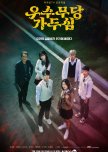
Teen Spirit With A Shaman Twist…
Let’s be honest. The Great Shaman Ga Doo Shim’ is a verbatim title. ( As there’s not a lot left to the imagination to work out what this drama is about.) Admittedly Park Ho Jin’s drama doesn’t try to brand itself as “ the next Goblin ” or a “ new fantasy phenomenon”. It is a teen “ cutesy” fantasy tale about the supernatural, but often leans more into the realm of “teen angst” with main leads Ga Doo Shim ( Kim Sae Ron) and fellow classmate Na Woo Soo( Nam Da Reum) ‘s journey through high school also. (At the time of writing director Park’s wish for a sequel season to explore more about the characters was confirmed also .)
As a consequence the drama featured an array of intriguing characters. However their ultimate contribution to the storyline and depth admittedly does vary dependent on screen time and the screenwriting also. Kim Sae Ron was fairly dynamic as quiet and mysterious high-schooler Ga Doo Shim. The former child actress carried an ambience of perfect angst, suaveness and longing which was perfectly matched for her role . As a character it was evident that Doo Shim could’ve gone down two possible routes; one-dimensional and unlikeable by being egotistical , or a more well-rounded heroine who has a likeable charm by struggling with her emotions and carrying empathy. ( Fortunately with our female lead it was the former case. )
Doo Shim’s character development was arguably the most pivotal from begrudgingly accepting that she can see ghosts and trying to be “ normal” , to opening up to new friends ( particularly Na Woo Soo) , feelings and understanding that she can use her powers for the greater good. Yet whilst her setbacks do help to make her feel realistically flawed, there are moments surrounding Doo Shim which felt like more of an excuse to “ heighten dramatic tension ” rather develop her character gradually or focus more time upon making Doo Shim feel realistic.
For example whilst Doo Shim’s relationship with her mother Hyo Shim( Bae Hae Seon) did see the typical rocky road between a parent and a daughter, there was a lot of missed opportunities to explore more about their complex bond . It was evident how much Hyo Shim genuinely cared for her daughter, however, Doo Shim and Hyo Shim rarely had opportunities outside of necessary plot to talk about their shared bereavement , feelings or emotions without queuing into comic relief or angst. Perhaps with a sequel season it is wrong to condemn a final verdict over this relationship as “ poorly-written” overall, however, hopefully season two will give more chances to covering this relationship rather than putting it on the back burner.
Then of course there’s our main male lead Na Woo Soo. Nam Da Reum did a great job as the plucky prodigy with a heart of gold . Initially starting off as a plot device in order to awaken Doo Shim’s “ character growth and feelings”, it was refreshing to see Woo Soo leave the realm as the prosaic potential “love interest” and the “ sidekick who is new to this world” to having more complex depth . One particular focal point to exploring Da Reum’s greater sense of altruism as a character came through his unusual friendship with underdog and best friend Kim Il Nam ( Yoon Jung Hoon). However this is also where we hit a major rut with Woo Soo as a character; he displays emotions, but he rarely acts out upon them unless they’re necessary to the storyline.
There was brimming potential to explore a lot more about Woo Soo’s darker side which he did display at points in the drama such as his silent threat to Jo Soo Jung ( Lee Ji Won) after her potential blackmail, as well as his anger at Kim II Nam during the main events of the storyline. When the story covered the major events surrounding Kim II Nam it seemed odd the drama switched Woo Soo’s personality towards being “ mopey yet calm” rather than using this as a golden opportunity to explore more about Woo Soo’s own negative feelings or hero complex, as well as heal the wound between Woo Soo and Doo Shim helping one another through these events.
Yoo Sun Ho’s performance as witty dead high schooler Hyun Soo was pretty delightful. As a character Hyun Soo serves both as an example of surprising comical foil as well as wasted potential also. On one side whilst Hyun Soo does have his more brief yet bittersweet moments surrounding his death and his search for his mother, he did often cool down more heavy scenes with deadpan expressions or annoying Doo Shim. However there was a lot of unexplored ground with Hyun Soo’s sentience in the series such as being a ghost, never being able to physically age( unlike Doo Shim or Woo Soo), his search for his mother as well as a lack of deep connection between himself and Doo Shim ( who she seems to have grown up with pretty much ) which were never explored and left anticlimactic with the way the drama abruptly ended l his character arc early on .
This moves us onto the antagonistic force of the drama. Now officially there are two antagonists in the drama; the malevolent sprit, and of course an “ unforeseen” antagonist ( until they were revealed after a major incident). Positively this did present more multi-layered complexity than the entity merely being the “ big bad”, as well as pointing out a clear sociocultural criticism towards the cruel “ dog eat dog” hierarchy in the South-Korean education system . On the other whilst their motive was clear and had the potential to be realistically intriguing , their actual reason covered textbook moustache-villainy rather than being given more intrinsic depth. The ending was ( unsurprisingly) fairly anti climatic- not bad per say and certainly helping to add a more conclusive ending for our antagonists, as well as a. interpretative finale for our main leads but nevertheless slightly rushed with the climax coming to a halt early on, rather than being built up or allowing time for rising tension.
So is ‘ The Great Shaman Ga Doo Shim’ actually worth watching? Park Ho Jin does a good job at building up our main characters as endearing and likeable leads which are further sold by dynamic performances with Kim Sae Ron and of course Hyun Soo, as well as the mystical and supernatural lore of the drama. On the other hand whilst Ho Jin’s potential sequel season could give room for tying up loose ends and problems ( including exploring character depth and relationships which sometimes felt disregarded), there were several inconclusive screenwriting moments which often felt rushed, cliche, one-dimensional or anticlimactic . Overall ‘ The Great Shaman Ga Doo Shim’ certainly remains one of the stronger fantasy drama contenders for 2021 - it is not flawless from a screenwriting perspective and there’s a lot of ground that Ho Jin needs to cover going on forward, but a fairly easygoing watch.
Was this review helpful to you?
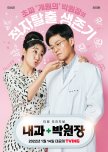
Will ‘ Dr Park’s Clinic’ Treat Your Expectations?
TVING originals have long been held in regard by critics and viewers alike for slick cinematography and shots. However, ‘ Dr Park’s Clinic’ was an odd anomaly. The series’ shaky camera shots and editing presented the series as surprisingly mediocre for a TVNING original; a low-budget sitcom which whilst heartwarming in necessary parts, often struggled to truly deliver the last laugh.
Adapted from former doctor Jang Bong-Soo’s popular webcomic, the series revolved around Doctor Park Won Jang ( Lee Seo-jin); a seemingly third-rate doctor who has just opened his first medical clinic.
Despite constantly worrying about his recent onset of alopecia and his wife Sa Mo-Rim’s ( Ra Mi-Ran) overspending , Doctor Park’s dreams of becoming an affluent doctor are soon scuppered when his patient numbers begin to dwindle. Determined to turn things around, Doctor Park decides to do his utmost to save his clinic, even if it means unintentionally making things worse along the way…
Perhaps one notable thing to comment about the series is that ‘ Dr Park’s Clinic’ is a fairly lighthearted series for the most part. Whilst the series does delve into some darker and angst-ridden subject areas at times ( especially by the latter-half), screenwriter and director Seo Joon Bin was able to uplift the mood of the series with regards to one of the drama’s most questionable presences; the comic relief.
Admittedly it isn’t out of the question for a comedy series to experiment and diversify between different formats. This can often allow a series to reiterate satire, offer angst-free respite or even play around with wry comedy.
However one of the most apparent faults with screenwriter Joon Bin’s style is attempting miserably to strike a balance between being a jovial sitcom (fourth wall-breaking and comical setups ) and a more bittersweet , satirical brand of comedy ( particularly with its jokes surrounding capitalism, brands, medical condition and South-Korean work and social culture) but ended up doing both formats a disservice.
Admittedly ‘ Dr Park’s Clinic’ did attempt to offer viewers some emotional punches- a revelation from Dr.Park’s “tragic” past, several angst-ridden moments as well as a surprisingly uplifting and crisp ending along the way were specifically placed to evoke a twinge of sympathy and pity for viewers. Nevertheless, heartfelt moments were admittedly less impactful in the the long-term memory of viewers who will likely forget these moments after completing the series.
Lee Seo-jin ( ‘ Damo’, ‘ Yi San’ and ‘ Marriage Contract’) starred as main lead Park Won Jang, whilst costar Ra Mi-Ran ( ‘ The Himalayas’ ’, ‘ The Avengers Social Club’ and Black Dog ‘ ) played Won Jang’s wife and main female lead Sa Mo-Rim. Respectfully whilst both main leads’ performances could across as somewhat corny in parts, Ra and Lee offered solid performances throughout, with Ra Mi-Ran notably adding a surprisingly endearing charm to her onscreen persona.
The supporting cast offered decent performances. Whilst there were admittedly some strained deliverances of dialogue and acting, the supporting cast were able to offer some surprising charm during other moments in the drama.
In particular, the supporting cast included Cha Chung Hwa ( ‘ Harmony’, ‘ Black’ and ‘ Pawn’) as witty head nurse Choi Mi Young, Shin Eun Jung ( ‘East of Eden’, ‘ Faith’ and ‘ Navillera’) starring as angelic-faced yet acerbic- tongued Dr. Sun Woo Soo Jin , Kim Kwang Gyu ( ‘ Friend’, ‘ Scent Of A Woman’ and ‘ I Can Hear Your Voice’) playing mixed coffee-enthusiast , obstetrician and gynecologist Ji Min-Ji, Jung Hyung-Suk ( ‘ A Mystery Of The Cube’, ‘ The Banker’ and screenwriter and director for ‘ The Land of Seonghye’) as director of the urology department, whilst Seo Bum Jun ( ‘ Nevertheless’, ‘ Rookie Cops’) played the head nurse’s son and Joo Woo Yeon as well as child actor Kim Kang Hoon ( ‘ Mr Sunshine’, ‘ When The Camellia Blooms’ and ‘ Racket Boys’) took on the roles as Park’s two sons.
Due to the short length of the series, ‘ Dr Park’s Clinic’ is able to maintain a pacy speed throughout its duration. Naturally, the expedited narrative pacing did create a double-edged sword; fast-pacing helping to deescalate potentially tedious setups and scenarios, whilst sadly rarely giving opportunities and time to explore its odd array of characters and potentially tour de force moments either.
The cinematography of the series is notably a mixture of amateurish and surprisingly basic shots, as well as some insightful glimpses into the lives of our main characters. Whilst simplicity isn’t always necessarily bad per say, it could sometimes reduce opportunities in order to explore the intuitive shots or boast slick and unobstructed editing and cutting. The OST is also notably faintly memorable for viewers; helpful for promoting emotive moments and tones, but rarely delivering an impactful presence either.
Uplifting, lighthearted and melodramatic in parts, ‘ Dr Park’s Clinic’ is specifically what it says on the tin: a social comedy about a mediocre clinic with an array of eccentric characters being introduced onto the scene. The acting performances are decent enough but the deliverance of comic relief is admittedly variable. Perhaps the comical exchanges will generate a few laughs for audiences, whilst others may be dissatisfied by the generic setups and comical elements along the way. Overall, ‘ Dr Park’s Clinic’ is a decent binge-watch; watchable but lacking a certain memorable edge also.
Was this review helpful to you?
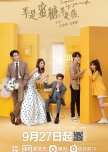
A Sugary Sweet Romance Story...
Love is Sweet accounts the tale of emotionally sensitive and hardworking investor Jiang Jun ( Bai Lu) , who after landing a place at MH firm, runs into her old childhood friend Yuan Shuai ( Luo Yunxi) , now one of her conniving bosses determined to make her life a living hell. As Jiang Jun tries to guide her new career between work and making allies with the sudden arrival of a new friend from a rival company Du Lei ( Gao Hanyu) , Yuan Shuai’s secret feelings from his youth are rekindled again for Jiang Jun, as Jiang Jun finds herself more and more bamboozled by Shuai’s actions.As you may have guessed, Love Is Sweet is filled with all the cliches and certainly isn’t what I’d typically define as “ original” or “ unique” in regards to a new concept for a Chinese drama. From high school crushes, boss and worker / cohabitation romances , excessive product placement ( looking at you Burberry ) and the “ older woman and younger man” tropes, it certainly does beg the question what on Earth is the point of watching a drama which has been seen and done before a million times.
Going into Love is Sweet with zero expectations ( and certainly seeing this concept done incessantly in Chinese Dramas before ), one of the things which immediately clarified the answer to this question for me, was its ability to hook you as a watcher from episode 1 ( despite the tropes) , something which must exceedingly be praised as a consequence of relationships between characters and of course the cast‘s acting abilities . None is this more shown than Bai Lu’s portrayal as Jiang Jun. Whilst I will be honest that Bai Lu didn’t entirely tread new ground within her new portrayal as the “ workaholic, independent woman” trope, yet, she did perfectly capture the essence of a successful, yet hardworking and emotionally- driven businesswoman (something which I wish some Chinese dramas would portray more in romance dramas rather than the “ airhead “archetype ). In addition to this, there is no denying that Bai Lu’s chemistry and the scriptwriting for her character was approached in a refreshingly modern manner to her romance with , Luo Yunxi’s character, Yuan Shuai.
Again, the relationship between Yuan Shuai and Jiang Jun has been seen and done before a million times in Asian Dramas, but, the one thing which did impress me in a more realistic manner ( and no, we are not talking about Shuai’s aftermath of excessive product placement in buying her gifts ) to their relationship rather than the “ tight embrace; do or die ” approach of most asian dramas, was that refreshing respect and obstacles within their relationship as two working individuals. This was shown particularly throughout the drama by ; the distances sometimes their jobs presented within travel, the occasional arguments and the respectful distance that the characters would take as well as respect of privacy ( well, in most cases),and of course ,Yuan Shuai’s refreshing speech near the end of the show, where he tells Jun that he will respect her choices, just as he hopes that she will respect his. Undeniably, this is something which was brilliantly portrayed by Bai Lu’s costar, Luo Yunxi, who took upon the role as the smart yet love crazy businessman brilliantly, and a portrayal which I hope that Asian Dramas seek to explore more often.
Like with all dramas, however, there is the dreaded cliches of love triangles without respect to the characters’ contrasting personalities in a forced manner, particularly through Du Lei ‘s sudden transition to feelings for Jiang Jun and of course, Jiang Jun’s supervisor Qiao Na ( Zhao Yuan Yuan)’s “ feelings since she knew him” cliche for Shuai. Whilst thankfully the show didn’t dive into the oldest trope in the book by putting Qiao Na and Du Lei together, there was still a lot of inconsistently with the love interests here for the leads; not least destroying the friendship between Du Lei and Jiang Jun ( with little redemption either ) and writing off Qiao Na’s feelings in order to make way for the relationship with Jiang Jun and Shuai by pairing her with a younger lead by the end of a drama. Whilst there was certainly nothing entirely wrong with deciding new love interests both characters, the way this was done demeaned a lot of unnecessary time in the show apart the obvious “ spanner in the works of love” trope, which took away a lot from both these characters as individuals.
On a more positive note, I was mildly surprised by the emotional depth behind the build-up of the relationship between Jiang Jun’s best friend Xu Li ( Shane Xiao) and Shuai’s younger cousin and technology genius Li Xiao
Chuan ( Riley Wang). Playing upon the overrused cliche of the “ older, slightly ditzy” woman and the “ younger, attractive and cool- headed” boy, it was inevitable both leads would end up with one another through the “ opposites, attract” scenario, yet, what did surprise me was that rather than the female lead entirely chasing after the Male lead, the show reversed the old trope by providing the Male lead being in the female lead’s shoes later in the show; as shown with his jealousy when Xu Li is “ being hit on ” by another guy. Whilst there are a couple of criticisms I do have within the portrayal of Xiao Chuan’s controlling nature over Xu Li at times during later scenes , it was a surprising reverse on the trope to see a level of depth to this cliche.
Overall, it’s fair to say that Love Is Sweet doesn’t tread on new ground with overrused tropes, product placement and inconsistencies for a romance drama. Despite this , it was a surprisingly enjoyable show within watching our two leads and our side couples slowly developing over the course of the drama without toxicity and often realistic mutual respect in their relationships , something which I’d hope more Asian Dramas will be able to portray in the future.
Was this review helpful to you?

A Good Side-Story…
We’ve all been there . The show or production which won our hearts, ignites intensified hope over news of a sequel or spin-off in the making, hype is sparked online and by word of mouth and then when we act will then receive the actual final product, it is often with mixed-results.
‘ Ashin: Kingdom Of The North’ could’ve easily gone in either of these directions. An official spin-off by original director Kim Sung Hoon and screenwriter Kim Eun Hee of the hit zombie period-series ‘ Kingdom’, ‘ Ashin: Kingdom Of The North’ had a lot of excitement and worry by watchers around the delivered result of a whole production focusing on a side character only shown briefly at the end of the second season.
As a character, the special is quick to cut short to the chase about her past without feeling disregarded or predominating screen time. The daughter of a secret spy who is devoted to Joseon in a border village, Ashin’s revenge becomes more prominent as the story plays out and takes her down many wrong paths. It was intriguing to see how the production could balance out between actually developing Ashin as more than a one-dimensional shell, by duelling this onscreen tale with the threat of the zombie outbreak beginning to take root. Yet viewers should not worry as the production balances out the two storylines as two sides of the same coin; different, yet helping to interchangeably motivate the events of one another as the production progresses.
As this was shown from Ashin’s view of the world at times, it was intriguing to wonder whether any original characters from ‘ Kingdom’ would pop up in the storyline. Sure enough, actor Park Byung Eun took a fairly central role again as Min Chi Rok, the heroic inspector general from the main storyline of ‘ Kingdom’. Intriguingly unlike in ‘ Kingdom’ and as prior events to the main storyline it was fairly astounding to see Chi Rok in a more antagonistic light. Whilst ‘ Ashin: Kingdom of North’ was merely the necessary foreground in order to establish the titular character properly before later seasons and there is still a lot of potential with understanding Chi Rok’s motives, it would have been equally interesting to invested a little bit of side time here within understanding Chi Rok’s shift from villainous to righteousness between the two storylines.
Of course any critique of this production would not be complete without mentioning the brilliance of Jun Ji Hyun as Ashin, as well of course younger actress Kim Shi Ah as Ashin’s younger-self. However , Ashin's character in this special episode doesn’t have a lot of dialogue opportunities. It is understandable this is meant to reflect Ashin’s sense of character, and Ji Hyun is really good with the source material ( even without as many speaking opportunities), but this is certainly a more critical point to note.
‘ Ashin; Kingdom Of The North’ was an outstanding move by the director and screenwriter to establish and bring to life Ashin as an individual in her own right, without straying away from the violent, historical or political undertones of past seasons. Although the storyline sometimes wobbled underneath the problem of with scenes over the long duration time, drawing away from the more thrilling adrenaline-infused rush of action shots, the screenwriter was by no means a mess. The special intensifies the warring troubles of political instability amongst the people, a spine-tingling soundtrack accompanied by beautiful cinematography, historically accurate onscreen costumes and dialogue that is further captivated by the brilliant performances of the main cast. A good watch.
Was this review helpful to you?
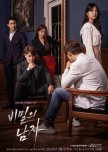
A Laughable and a Hare-Brained Makjang...
“A Man in a veil” is the epitome of the infamously coined “ Makjang” by South-Koreans ( used to describe plot concepts which are equivalent to the reputation of telenovelas - so ridiculous, cliche and unrealistic that they often fall into the “ so bad, it’s good” category). From ‘ pseudoscience’, ‘ revenge’ to ‘ lost family’ cliches, “ A Man in a veil” throws in all the towels to be a ridiculous hundred and five-episode extravaganza of wooden acting , fairly one-dimensional characters and tropes.“ A Man in a Veil ” takes on the typical revenge cliche of a man with an intellectual disability called Tae Poong ( Kang Eun Tak) whose destiny is gradually torn apart by two sisters; the intrinsically “selfish” Yu Ra ( Lee Chae Young) who begins to manipulate and blackmail him throughout the series, and the “ kind-hearted” sister Yu Jung ( Uhm Hyun Kyung) who holds strong feelings towards him. His life changes forever, however, when a tragedy causes a second chance for Tae Poong to extract his revenge on everyone who has wronged him.
Whilst the revenge cliche was possibly the most intriguing of the show, “ A Man in a Veil” didn’t truly use this to either flesh-out nor deepen the characters, with Tae Poong often feeling more like a “ stock male lead” with little interest for viewers or emotional depth behind his actions. ( Apart from Eun Tak’s random screaming matches and “pained “ facial expressions when it was necessary for the “ plot”). Arguably, Yu Jung did have a little more depth than Tae Poong, due to her complicated feelings for both him and the second male lead Seo Jun ( Lee Shi Kang), her later tragedy and motivation towards getting back at her sister and a family revelation as well. On the other hand, considering the emotional and traumatic depth in reality towards this tragic event which took place in the series, Yu Jung not mentioning this again after it was necessary for the “ story” felt both lacklustre and poorly- written in the grand scheme of character- writing.
Ironically , one of the worst-written characters in the show must go towards Yu Ra as both an individual and an antagonist . It was evident from the get-go that screenwriter Lee Jung Dae wasn’t attending to make Yu Ra a “ sympathetic villain”” - she’s inherently a selfish and despicable character who later becomes deluded by her own abilities to outwit others. On the other hand, it’s hard to really understand what makes Yu Ra actually tick or the actual motives behind her thoughts, apart from not wanting to “ be in poverty” and “ survive”. To make matters worse, we very rarely got to see Yu Ra as an actual human being. The several moments which could have offered genuine intrigue into Yu Ra as a character ( such as her past and later events) were entirely written-off to make Yu Ra’s schemes more and more unbelievably ridiculous by each episode. ( Counterpart to the other antagonistic character played by Kim Hee Jung as Joo Hwa Yeon.)
This certainly leads the storyline to take on a dragging and lacklustre focus between the three primary storylines; Tae Poong and his revenge, Yu Ra’s attempt to climb-up the social ladder and the dirty secrets of their associates ( including Yu Jung and Yu Ra’s parents as well as Seo Jun’s mother and father). Whilst arguably each storyline did have some attraction in how they played out, before even the halfway point, the show began to draw itself too much away from the main protagonist’s own ventures into other characters’ lacklustre storylines, which took away many of the twists which were supposed to be “ emotional” and “ shocking” for viewers with little delivering impact for viewers .
Consequently the plot inconsistencies of the show were beyond incoherent - CCTV cameras, criminal investigations and actual forensics are nonexistent , the characters are ridiculously dumb enough to make the same mistakes over and over in favour of “ plot motivation” and later “relevant twists” completely contradict earlier statements made in the show.
Perhaps it is due to the fact that the show is so detached from coherent plot line , or, the fact that the stylist’s choices are so outdated ( including product placement) helps the show to seem older , but, “A Man In A Veil” is a perfect example of a show more than a decade behind recent trends - the characters have no depth or actual intrigue for viewers , the storyline is filled to the brim with more and more ridiculous cliches, and even the ending felt a little lacklustre. ( In particular after building more than 80 episodes of Tae Poong seeking revenge only to be “ miraculously solved” with little sense of conflict or poetic justice for our main lead . )It’s fair to say that “ A Man in a veil” is a typical makjang- certainly not worth watching if you’re looking for something deep, but so laughable, it keeps you watching to see what hare-brained scheme the scriptwriter tried to come up with next.
Was this review helpful to you?
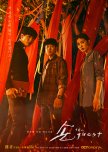
One Of The Best Korean Dramas In Years....
There has been a noticeable recent wave of South-Korean horror shows in recent years, and there’s no denying that OCN’s The Guest (2018) is not a byproduct of this recent trend.Yet despite this label as a contemporary drama, The Guest truly plays upon something timelessly classic within its universal horror theme of primeval and the unknown through suspense and dread.
The story premise revolves around our main Male lead, psychic Hwa Pyung ( Kim Dong Wook) chasing after a malevolent demon called Sohn who disturbingly drives people insane. Under the non-conspicuous job occupation as a taxi driver, Hwa- Pyung’s journey to finding Sohn seemingly becomes closer when he is invariably connected with the mysterious Catholic priest Choi Yoon ( Kim Jae Wook) and cynical detective Kang Gil Young ( Jung Eun Chae) ; all of whom have mysterious links to Sohn through their pasts.
As our main lead,Kim Dong Wook seems an unlikely choice to play our main hero,however, his sense of genuine sincerity and anguish in his performance truly captured the essence of Hwa Pyung as a sincere and scarred individual. Alongside Dong Wook costar Kim Jae Wook’s role as the aloof and taciturn Catholic Priest Choi Yoon, truly captured the intrinsic and deeper questioning of a man shaped by traumas. Although less in the limelight than her fellows costars, Eun Chae channelled also the genuine cynicism and doubt of one of the few female officers in her department as well as an individual led by logic.
Yet beyond some more questionable acting performances by some members of the cast, The Guest’s beauty lay within its characterisation; Choi Yoon initially distrusts Hwa Pyung just as much as Eun Chae is doubtful of the “ mumbo jumbo” beliefs of the “ superstitious” duo on their first initial meeting. It is only when the entire trio are forced to rely heavily upon one another, that they begin to develop genuine friendships and bonds, trialed and tested repeatedly throughout the drama’s later revelations.
Adding to theme of horror , The Guest refreshingly did not rely upon cheap jump scares to generate the genuine bloodcurdling moments when demons transcended beyond the realms of nightmares to reality.
In one scene in particular when Hwa- Pyung is walking through a hospital, the specific usage of lucid lighting and an eery blue glow in the background will truly send shivers down your spine before the climax of the scene. In another scene in the show, Yoon’s quick walk down a district street in Seoul becomes contorted with distorted streetlights, a clear and purposefully ironic homage to The Exorcist (1973).
Although not flawless from several moments of lacklustre acting and undeniably slow pacing in earlier episodes, The Guest was undeniably a brilliant show filled with intriguing storyline, characters and true spine tingling moments as well. Certainly one of the best Korean Dramas in a long time.
Was this review helpful to you?
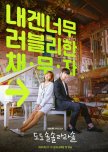
Twinkle, Twinkle But Not A Gem..
The Story; Do Do Sol Sol La La Sol ( roughly translated to ‘ Twinkle, Twinkle Little Star’ from Romanised Korean), tells the story of an affluent girl who is a dreadful pianist, Goo Ra- ra ( Go Ara). When her life hits rock bottom, she ends up running again into the mysteriously hardworking Lee Jae- wook (Sunwoo Joon). Together with Jae- wook and her new friends, Ra- ra might just find the answer to getting her life back on her feet through the kindness of strangers and new love.The Characters; The show offered an odd mix of characters both endearing and lacking characterisation. As our main protagonists go, Ra- Ra was mostly driven as a weeping heroine with little emotional depth. Considering Ra- Ra lost her mother, father and has gone through Hell and Back, there was so much potential for the scriptwriters to induce a level of pity or teaching her character about the realities of life. Instead, any hope for Ra- Ra to be a realistic female lead is thrown out the window in pace of her romance with Jun. Even small actions regarding Ra- Ra by the scriptwriters such as her mysterious multitude of outfits ( and not considering even in the beginning of the show to perhaps sell them to help pay for Jun), the expenses of her hospital fees and her seemingly remaining oblivious to the Doctor and Jun’s secrets, added little to her character. Moving on to our main lead, it’s fair to say that he was perhaps slightly more tolerable for audiences as he seemed to realistically carry emotional burdens upon his back as well as mysterious secrets. Sadly, rather than trying to allow Jun to face his own demons by spending time with Ra- Ra , the scriptwriters tried too hard to add obstacles within their relationship through the strange plot twist near the ending of the show. Whilst this did help for Ra- Ra and Jun to explore their relationship, it seemed just to point out that none of the characters in the show were truly grounded in reality.
Relationships between characters; Perhaps my one appraisal for the show is the Mother- Daughter bond between Jin Sook-kyeong ( Ye Ji- Won) and Jin Ha-yeong ( Shin Eun Woo) . For a show grounded in romance, there was a surprisingly familial turn upon learning that the seemingly daft and flirtatious hair stylist , Jin Sook- kyeong, got a surprising moment of characterisation through learning of her hardships and her actual affection as a single mother for her daughter. Similarly, it was equally sweet that Sook-kyeong, Ha- Yeong and Ra-Ra developed a strong bond between one another as the show progressed. I have a couple of complaints, however, about the need for Sook-kyeong and Ha- yeong to have romantic interests in the show. Whilst there’s obviously nothing wrong with either character having their own love interest, it seemed out of character at times when there could have been more focus upon the characters as individuals. For me, this was seen especially with Ha- yeong. Whilst the scriptwriters dropped the hints, the ending seemed to deny a lot of Ha- yeong’s potential to continue with a successful career.
On other notes, there were other signs of familial love within the show such as Jun and his mother ( Seo Yi Sook) and , the child prodigy, Jae- Min who develops a familial bond with our characters. On a romance level, the show was a bit of a mixed bag. Once Jun’s secrets were exposed it did put a bit of edge for viewers between their relationship, but, perhaps one of the things which didn’t entirely add up for us as viewers, was the revelation towards Ra- Ra not recognising Jun from the past. Whilst it’s natural her memory might’ve been a bit hazy, it seemed a little strange that she didn’t even mildly recognise Jun at the concert hall or at the wedding either. Naturally, there is of course the ‘ second Male lead syndrome’ of the tired Doctor Eun- Seon ( Kim Joo- Hun) . Whilst there were a couple of factors which made Eun- Seon a little more appropriate for Ra- Ra, Eun- Seon came across as a little too forceful of Ra- Ra’s privacy at times, something which struck a nerve with me. The other evident factor was that once Jun swooped in, his “ fanatic feelings” seemed to mysteriously disappear. Whilst the scriptwriters evidently didn’t want to spend hours upon Eun- Seon falling out of love, it was another case and point of bad characterisation that we didn’t get to see Eun- Seon’s reactions as a human being.
Acting; Go Ara struck me as an unusual choice to play a romantic female lead. Typically taking on more gritty or melodramatic styles such as Black and Haechi, it wasn’t that Ara was necessarily bad within playing Ra-Ra, and in fact, exposed herself as an actress by not being typecasted as the action heroine. ( An ironic reversal for most female actresses). On the other hand, to put it simply, , she just didn’t add anything new or illuminating to her role. (Admittedly, this was also the fault of the scriptwriters as well) Moving onto our Male lead, Lee Jae- Wook has really been rising to providence as a romance actor after his appraised role in Extraordinary You. Whilst I wasn’t a great fan of the show, Jae- Wook’s acting did peak my interests as a potentially good actor. It was clear to see that Jae- Wook put his heart and soul into the drama within his role as Jun, however, in a similar manner to Ara, Wook didn’t bring anything new or exciting to his take on the Male lead. (Perhaps a personal thought upon Jae- Wook is that whilst he took the role on within the popular genre of romance, he should explore outwards into different genres in order to explore his boundaries of acting).
OST/ Cinematography ; Whilst the show plays upon classical music and standard panel shots, there was a lot which could’ve been explored with the usage of music and cinematography hand in hand.
Plot thoughts; In all honesty, the actual plot of the drama isn’t terrible. What it certainly isn’t is overwhelmingly impactful, original or intriguing for audiences. The cliches have simply been seen and done before; the sanguine and dippy rich girl who learns life lessons, the hardworking Male lead , illnesses and hidden pasts as well. The biggest fault within playing upon these cliches is that the audiences rarely get to see the characters as human beings, rather than merely plot devices. As a consequence, whilst sugary sweet with a bittersweet ending, the drama was overly unrealistic and easily forgettable for the next Korean Romance Drama succeeding this one. .
Was this review helpful to you?
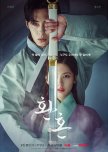
The Hong Sisters Are Back…
The Hong Sisters have produced wide scope of dramas over the years with respectfully mixed results . Enter ‘Alchemy Of Souls’: The Hong Sisters’ latest fantasy creation and arguably one of their most ambitious works yet.
In the series, main heroine Naksu (Go Yoon-jung-‘ Sweet Home’, ‘ Law School’ and ‘ Moving’) is a fearless and sword-wielding assassin. She lives in Daeho; a magical land where sorcerers have extraordinary abilities and powers. Yet despite the beauty of different types of magic, there is still one major taboo in Daeho: soul transfiguration. ( The act of displacing one soul into another body.) Caught between a rock and a hard place, the ruthless and instinct-driven female lead is forced to partake in this soul shifting process in order to save her own skin. She finds herself in the body of peasant girl Mu-Deok (Jung So-min- Playful Kiss’, ‘ Because This Is My First Life’ and ‘ Monthly Magazine’).
Meanwhile unbeknownst to the female lead , her destiny is about to change even more when she winds up striking an unconventional alliance with Jang Uk ( Lee Jae Wok- ‘ Search: WWW’, ‘ Extraordinary You’ and ‘ Do Do Sol Sol La La Sol’), the notorious son of the prestigious and magical Jang family. Jang Uk has his own personal reasons for striking an unusual contract with Naksu. However, thanks to their new relations, they will soon discover that their bond will greatly alter their own destinies for better or for worse.
As mentioned previously, ‘ Alchemy Of Souls’ is arguably one of the Hong Sisters’ most ambitious works yet. While the series has admittedly received mixed-reception by some for its format, it is filled to the brim with the duo’s creative and imaginative world-building in a manner that will likely remind some of their previous hit-drama ‘ Hotel Del Luna’. However while ‘ Hotel Del Luna’ seemed to heavily lean into the genres of dark fantasy and melodrama, ‘ Alchemy Of Souls’ is predominantly focused on its action fight scenes and the conflicts surrounding its setting and the lives of its characters. The series certainly does lean into heavier scenes ( especially with regards to the magical lore of Daeho ) but a lot of these more “morbid” or “disturbing” moments often came through the ambivalent moral choices and decisions of the drama’s characters. ( At the end of the day, the jarring decisions made by humans.)
However on a slightly lighter note, it is fair to say that ‘ Alchemy Of Souls’ is fuelled on pure fantasy. The world-building of the series is detailed at times and filled with a lot of fascinating beauty also. On the other hand despite the creativity evidently present in the Hong Sisters’ drama, ‘ Alchemy Of Souls’ does admittedly hit a few ruts when it came to execution.
Some of the forms of magic tackled in the Hong Sisters’ drama are certainly impressive. However while the presence of magic in ‘ Alchemy Of Souls’ was often detailed, there were moments in the narrative where viewers were expected to “ just know” things without a lot of further clarification or information provided. In addition to this, there is also the prominent issue with the patchy lore of ‘ Alchemy of Souls’ in different parts of the narrative. ( Such as the hierarchies of magical families, the out-rankings of certain magical abilities and exactly why certain noble families are able to get away with literal murder while others accused of killing individuals are subjected to literal witch hunts.)
The Hong Sisters’ drama is what many would probably define as an eclectic mixing pot of genres. There are noticeable elements of action-fantasy but surprisingly romance and comedy at times also. This variety of genres will likely offer viewers with a wide range of different moods and tones in different episodes. However despite the continuous strain of creativity in ‘ Alchemy Of Souls’, it is hard to not bring up one of the drama’s more tiresome issues; the tropes. Of course, the induction of cliches into K-dramas isn’t always a bad thing per say.
However, it did seem slightly surprising that even for well-established writers such as the Hong Sisters, there wasn’t a lot of originality or creativity put into these tropes. Instead enforced cliches such as the love triangle, the strong and cold heroine, the snarky male lead, a troubled past lover and some questionable comic relief wormed its way noticeably into ‘ Alchemy Of Souls’ with some varying and mixed results.
Lore and genres aside, there is also the crucial discussion surrounding the characters of ‘ Alchemy Of Souls’. The Hong Sisters seemed to have attempted a ‘Game of Thrones’-style approach with introducing a consortium of different characters (often with dubious morality) in a short space of time. This approach is not always terrible from a writing perspective and certainly did allow viewers to be introduced to some intriguing players in the narrative such as Yoo Jun Sang ( Park Jin), head of the mysterious group Songnim, Go Won ( Shin Seung Ho), the crown prince and potential future king of Daeho and Jin Cho Yeon ( Arin) , the youngest daughter of the Jin Family. However while some of these characters were well-tackled and intriguing in their own right, the lack of opportunities to flesh-out some of these characters did become noticeable as the season progressed.
Main heroine Naksu ( alternatively known as Mu-Deok in the body of the peasant girl) is played by two different actresses; Go Yoon Jung and Jung So-Min. Both actresses delivered fairly consistent dual performances as the main female lead. Admittedly main actress Jung So Min could feel a little flat with her line deliverances at times but this wasn’t entirely the fault of the actress per say.
As a written character, Naksu is a bit of a tough nut for viewers to crack. The Hong Sisters establish early on to viewers that she is a strong, fearless and powerful female assassin. Even in her newfound predicament in the weakened body of Mu-Deok, she takes advantage of her situation by allowing others to underestimate her abilities and seek revenge on those who have wronged her. ( For reasons which are roughly outlined in later episodes.)However in terms of being a likeable heroine who viewers can actually root for, Naksu will likely either be loved or hated by viewers of equal measure .
Of course, the Hong Sisters have attempted to offer sympathy for Naksu to viewers. As the season progresses into later episodes, the writing duo present the fact that Naksu is motivated for particular reasons and motives as well as her unconventional relationship with Jang-Uk.However, writing a strong character(especially a heroine) can often lead to writers falling into the trap of making their characters feel somewhat overly “invincible” or “overpowered” rather than human with actual flaws and issues. Of course, the Hong Sisters have arguably attempted to show this by certain vulnerabilities for Naksu but often this was approached in a way of a “ challenge” for the female lead in order to overcome. Rarely was this shown as an actual problem or flaw that truly allowed her to flourish and grow as a main character.
Costarring alongside the main female leads, there is also the actor of main male lead Jang Uk, Lee Jae Wook. Jae Wook is likely familiar for most viewers for his stoic potential love interest roles in romance dramas. Similarly in ‘ Alchemy Of Souls’, the actor is typecast somewhat again in the series as Jang Uk ; a brooding and deadpan character that viewers will ( similar to Naksu) either love or hate. Of course it is wrong to make out that Jang Uk is a purely despicable character. Similar to the show’s heroine, Naksu, the male lead has his own motives, his own complex backstory and is shown to be an intellectual than allowed him to be fairly interesting in his own right.
In addition to this , there were certainly moments regarding the main male lead’s backstory that were given a dedicated amount of coverage by the drama’s writers also. However, it could sometimes feel as though that Jang Uk’s dominating traits of arrogance and haughtiness were often mistakingly justified by the Hong Sisters as a “result of his situation” rather than simply being explained and used as a stage of further character development. (Often this resulted in some of Jang Uk’s actions feeling frustratingly repetitive or justified even when there was a necessity for them to be called out otherwise.)
Naturally, it is hard not to discuss the main leads without bringing up their oddball relationship over the course of the season. The Hong Sisters play upon the old trope of the cohabitation drama with the “ master and servant” roles being unconventionally swapped throughout between Jang Uk and Naksu ( in the body of Mu-Deok). This unusual relationship dynamic was certainly compelling for viewers and did allow for the slow-burn romance to satisfyingly thrive in this written relationship setup.
Although often entertaining and certainly generating a few laughs with their comical antics, it could grow a little repetitive at times to see their relationship going from one or two extremes without a lot of middle ground between either being serious or overly jokey . This became especially noticeable when it was placed against the somewhat convoluted induction of the “ love triangle”; a trope that while not overly dominant in the major storyline events of ‘ Alchemy Of Souls’, did play a role beyond its necessary requirements.
As for the narrative structure, ‘ Alchemy Of Souls’ is approached in different layers by the Hong Sisters. In early episodes of the series, the writing duo used their time wisely to establish some of the main narrative events, while later episodes heavily dived into further execution and progression. On the other hand while this is certainly not an unusual writing decision in K-dramas, it did often make the series feel somewhat somewhat slow-paced in parts. As a result of this writing decision, ‘ Alchemy Of Souls’ often felt as though parts of the events surrounding subplot and even some moments of the major storyline weren’t as well-rounded as they should’ve been. However, the Hong Sisters did deliver a thrilling season finale that will likely surprise and intrigue viewers with its ending note .
The stylistic approach of ‘ Alchemy Of Souls’ is admittedly where things become a little more rocky. Under director Park Joon Hwa ( ‘ Bring It On, Ghost’, ‘ What’s Wrong With Secretary Kim?’ and ‘ Touch Your Heart’), the series did present a gorgeous array of sleek and gorgeous scenes and palette schemes. However, it is likely that the opinions of viewers will remain somewhat divided by the heavy reliance on CGI over the course of the series. ( Especially with regards to the quality of green screen scenes not always matching up with the desired intentions of the Hong Sisters’ vision.)
In addition to this, there is also the slight nuanced issue surrounding the more stark modern presentations of certain characters with dyed hair and modern-takes on historical outfit designs. Although this is a fictional work and can maybe be excused on some grounds with an artistic licence, it was sometimes hard as a viewer to really immerse yourself in a historical fantasy world when certain actors had their hair dyed in an obviously modern manner.
Nevertheless despite some liberties being taken with the outfit designs, they were certainly impressive outfit decisions taken by the costume department onscreen. The shades of silk and materials used were often vividly bright in the show’s lighting ; often seeming ethereal on the frames of the actors as they were adorned in bright shades of peacock blue, marigold and deep vermillion and certainly helping to embody the magical element of the show.
Aside from the stylistic approach of ‘ Alchemy of Souls’, the OST was mainly composed of schmaltzy ballads. Certainly some of these songs were more memorable than others such as “ Scars Leave Beautiful Trace” ( 상처는 아름다운 흔적이 되어) by Car, the Garden and "Breath" (숨결) by Kim Na Young.
‘ Alchemy Of Souls’ is an ambitious fantasy epic by the Hong Sisters. It is imaginative and filled with some intriguing world-building, characters and a fairly enthralling plot objective that will keep viewers intrigued. In addition to the writing of the show, Director Hwa’s varied palette schemes and lighting choices help to truly bring the series to life in a magical manner. On the other hand, the writing duo’s project is not flawless. The CGI is varied from scene to scene while the characters of the series and the events of the narrative felt somewhat overly niche and rushed at times. Nevertheless with a potential sequel in the works and a certain possibility to fix some of these weaker writing moments, season one of ‘ Alchemy Of Souls’ is certainly a satisfying appetiser for any fantasy lover.
Was this review helpful to you?























